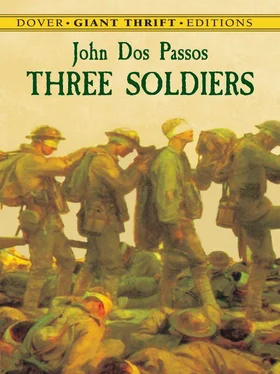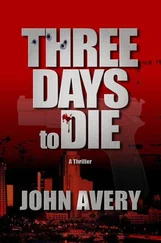“What d’you mean, this labor battalion? Hell, a feller can put up with anything; that’s one thing you learn in the army.”
“I guess people would rather put up with things than make an effort to change them.”
“You’re goddam right. Got a butt?”
Andrews handed him a cigarette. They got to their feet and walked out into the twilight, holding their mess kits in front of them. As they were washing their mess kits in a tub of greasy water, where bits of food floated in a thick scum, Hoggenback suddenly said in a low voice:
“But it all piles up, Buddy; some day there’ll be an accountin’. D’you believe in religion?”
“No.”
“Neither do I. I come of folks as done their own accountin’. My father an’ my gran’father before him. A feller can’t eat his bile day after day, day after day.”
“I’m afraid he can, Hoggenback,” broke in Andrews. They walked towards the barracks.
“Goddam it, no,” cried Hoggenback aloud. “There comes a point where you can’t eat yer bile any more, where it don’t do no good to cuss. Then you runs amuck.”
Hanging his head he went slowly into the barracks.
Andrews leaned against the outside of the building, staring up at the sky. He was trying desperately to think, to pull together a few threads of his life in this moment of respite from the nightmare. In five minutes the bugle would din in his ears, and he would be driven into the barracks. A tune came to his head that he played with eagerly for a moment, and then, as memory came to him, tried to efface with a shudder of disgust.
“There’s the smile that makes you happy,
There’s the smile that makes you sad.” It was almost dark. Two men walked slowly by in front of him.
“Sarge, may I speak to you?” came a voice in a whisper.
The sergeant grunted.
“I think there’s two guys trying to break loose out of here.”
“Who? If you’re wrong it’ll be the worse for you, remember that.”
“Surley an’ Watson. I heard ’em talkin’ about it behind the latrine.”
“Damn fools.”
“They was sayin’ they’d rather be dead than keep up this life.”
“They did, did they?”
“Don’t talk so loud, Sarge. It wouldn’t do for any of the fellers to know I was talkin’ to yer. Say, Sarge… ” the voice became whining, “don’t you think I’ve nearly served my time down here?”
“What do I know about that? ’Tain’t my job.”
“But, Sarge, I used to be company clerk with my old outfit. Don’t ye need a guy round the office?”
Andrews strode past them into the barracks. Dull fury possessed him. He took off his clothes and got silently into his blankets.
Hoggenback and Happy were talking beside his bunk.
“Never you mind,” said Hoggenback, “somebody’ll get that guy sooner or later.”
“Git him, nauthin’! The fellers in that camp was so damn skeered they jumped if you snapped yer fingers at ’em. It’s the discipline. I’m tellin’ yer, it gits a feller in the end,” said Happy.
Andrews lay without speaking, listening to their talk, aching in every muscle from the crushing work of the day.
“They court-martialled that guy, a feller told me,” went on Hoggenback. “An’ what d’ye think they did to him? Retired on half pay. He was a major.”
“Gawd, if Oi iver git out o’ this army, Oi’ll be so goddam glad,” began Happy. Hoggenback interrupted:
“That you’ll forgit all about the raw deal they gave you, an’ tell everybody how fine ye liked it.” Andrews felt the mocking notes of the bugle outside stabbing his ears. A non-com’s voice roared: “Quiet,” from the end of the building, and the lights went out. Already Andrews could hear the deep breathing of men asleep. He lay awake, staring into the darkness, his body throbbing with the monotonous rhythms of the work of the day. He seemed still to hear the sickening whine in the man’s voice as he talked to the sergeant outside in the twilight. “And shall I be reduced to that?” he was asking himself.
Andrews was leaving the latrine when he heard a voice call softly, “Skinny.”
“Yes,” he said.
“Come here, I want to talk to you.” It was the Kid’s voice. There was no light in the ill-smelling shack that served for a latrine. Outside they could hear the guard humming softly to himself as he went back and forth before the barracks door.
“Let’s you and me be buddies, Skinny.”
“Sure,” said Andrews.
“Say, what d’you think the chance is o’ cuttin’ loose?”
“Pretty damn poor,” said Andrews.
“Couldn’t you just make a noise like a hoop an’ roll away?”
They giggled softly.
Andrews put his hand on the boy’s arm.
“But, Kid, it’s too risky. I got in this fix by taking a risk. I don’t feel like beginning over again, and if they catch you, it’s desertion. Leavenworth for twenty years, or life. That’ld be the end of everything.”
“Well, what the hell’s this?”
“Oh, I don’t know; they’ve got to let us out some day.”
“Sh… sh… ”
Kid put his hand suddenly over Andrews’s mouth. They stood rigid, so that they could hear their hearts pounding.
Outside there was a brisk step on the gravel. The sentry halted and saluted. The steps faded into the distance, and the sentry’s humming began again.
“They put two fellers in the jug for a month for talking like we are… In solitary,” whispered Kid.
“But, Kid, I haven’t got the guts to try anything now.”
“Sure you have, Skinny. You an’ me’s got more guts than all the rest of ’em put together. God, if people had guts, you couldn’t treat ’em like they were curs. Look, if I can ever get out o’ this, I’ve got a hunch I can make a good thing writing movie scenarios. I want to get on in the world, Skinny.”
“But, Kid, you won’t be able to go back to the States.”
“I don’t care. New Rochelle’s not the whole world. They got the movies in Italy, ain’t they?”
“Sure. Let’s go to bed.”
“All right. Look, you an’ me are buddies from now on, Skinny.”
Andrews felt the Kid’s hand press his arm.
In his dark, airless bunk, in the lowest of three tiers, Andrews lay awake a long time, listening to the snores and the heavy breathing about him. Thoughts fluttered restlessly in his head, but in his blank hopelessness he could only frown and bite his lips, and roll his head from side to side on the rolled-up tunic he used for a pillow, listening with desperate attention to the heavy breathing of the men who slept above him and beside him.
When he fell asleep he dreamed that he was alone with Geneviève Rod in the concert hall of the Schola Cantorum, and that he was trying desperately hard to play some tune for her on the violin, a tune he kept forgetting, and in the agony of trying to remember, the tears streamed down his cheeks. Then he had his arms round Geneviève’s shoulders and was kissing her, kissing her, until he found that it was a wooden board he was kissing, a wooden board on which was painted a face with broad forehead and great pale brown eyes, and small tight lips, and all the while a boy who seemed to be both Chrisfield and the Kid kept telling him to run or the M.P.’s would get him. Then he sat frozen in icy terror with a bottle in his hand, while a frightful voice behind him sang very loud:
The bugle woke him, and he sat up with such a start that he hit his head hard against the bunk above him. He lay back cringing from the pain like a child. But he had to hurry desperately to get his clothes on in time for roll call. It was with a feeling of relief that he found that mess was not ready, and that men were waiting in line outside the kitchen shack, stamping their feet and clattering their mess kits as they moved about through the chilly twilight of the spring morning. Andrews found he was standing behind Hoggenback.
Читать дальше












